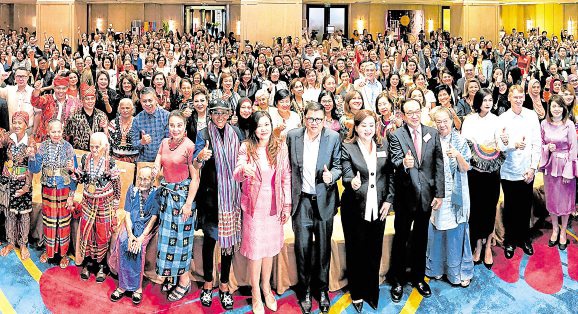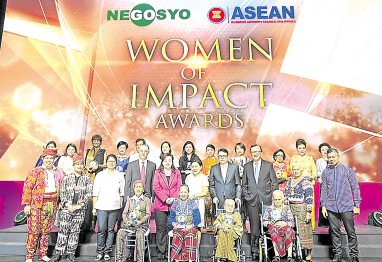Weaving a brighter future for women

Philippine weaving industry stakeholders gather at the Go Negosyo event to discuss the country’s rich weaving culture.
Fashion might seem like an indulgence for the affluent, but Bibi Russell said it could actually be a vehicle for sustainable social development.
Russell, founder of Bangladesh’s Bibi Productions, was speaking primarily of fashion that used and promoted indigenous fabrics and designs. The Bangladeshi spoke recently at the Forum on Women of Impact during Go Negosyo’s conference to mark Women’s Month and International Women’s Day on March 8.
“Sustainability has to be linked to development,” Russell said. She proposed opening up the market for indigenous fabrics by targeting mid-level consumers. “People are looking for beautiful things but they are either expensive or cheap.”
During a panel discussion on Fashion for Development in the Philippine Context, speakers outlined their efforts to revive, sustain and make the production of local fabrics financially rewarding for the few weavers who persevered and to encourage new talents.
Rep. Loren Legarda of Antique pointed to the passage of the Philippine Tropical Fabric Law, which she sponsored, as a significant boost to the local weaving industry and a big help to those who depend on it for their livelihood. Fashion designer Ditta Sandico, who had to overcome various challenges in the 35 years she had been using local weaves for her clothes, said she welcomed the enactment of the new law, as it could help with her new initiative to engage Mangyan weavers of Mindoro.
Maribel Ongpin, founder of Habi Textile Council, called attention to the shortage and/or lack of supply of key materials, like cotton. Prices are low, farmers do not have access to credit and have little knowledge of entrepreneurship, she said. Farmers have to be encouraged to plant cotton again, which had been a material for indigenous fabrics for four centuries.
Anthony Cruz Legarda, fashion designer and textile technologist, said that in the high-end market, consistency in quality was very important. Part of his efforts to raise the profile of local fabrics was to find master weavers.
In Cambodia, said Sopheap Chen, founder and managing director of Cambodia’s Keiy Tambanh Khmer, local fabrics are used for special events and formal occasions like conferences and big meetings.
Jeannie Javelosa, lead of Great Women in the Asean Initiative, said their strategy to make fabric-making more profitable for weavers was not to replicate what others are already doing.
“We have to come up with something unique,” she said.
The sale of their products at good prices, said former actor Dina Bonnevie-Savellano, encouraged the weavers. Savellano, who relocated to Ilocos Sur when she married the province’s former vice governor, said she brought to her new “home” her experience as a Bicolana whose family was into abaca production.
Penshoppe chief marketing officer Alice Liu said most of the ready-to-wear chain’s products were made locally, which helped local garments producers.
Russell stressed that the weaving process supported several people.
“One hand-made product supports a whole family,” she pointed out.
Honeylet Avanceña, who delivered a message, said the forum paid tribute to resilient women. She said Women’s Month sought to highlight gender equality.
In his welcome remarks, Jose Ma. Concepcion III, Go Negosyo founder and presidential adviser for entrepreneurship, said the event aimed to help empower women weavers “who need support, financing and other forms of assistance”.
He said they wanted to make the production of indigenous fabrics viable to inspire the young to be part of the enterprise. They also wanted to encourage local designers to use materials from local weavers.
Another session during the event shone the spotlight on the country’s Manlilikha ng Bayan, master traditional weavers. Featured were Yabing Masalon Dulo of South Cotabato, master of the Mabal Tabih technique; Magdalena Gamayo of Ilocos Norte, abel weaver; Ambalang Ausalin of Lamitan City, Yakan weaver; and Estelita Tumandan Bantilan of Saranggani, B’laan weaver. —CONTRIBUTED
